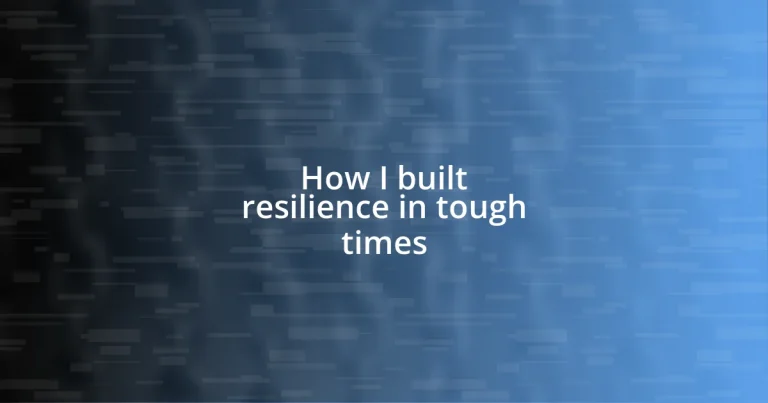Key takeaways:
- Resilience is a mindset that involves reframing challenges as opportunities for growth and cultivating supportive relationships.
- Setting realistic, manageable goals and celebrating small victories can aid in recovery and help maintain motivation during tough times.
- Practicing self-care techniques, including mindfulness and physical activity, is essential for nurturing resilience and emotional well-being.
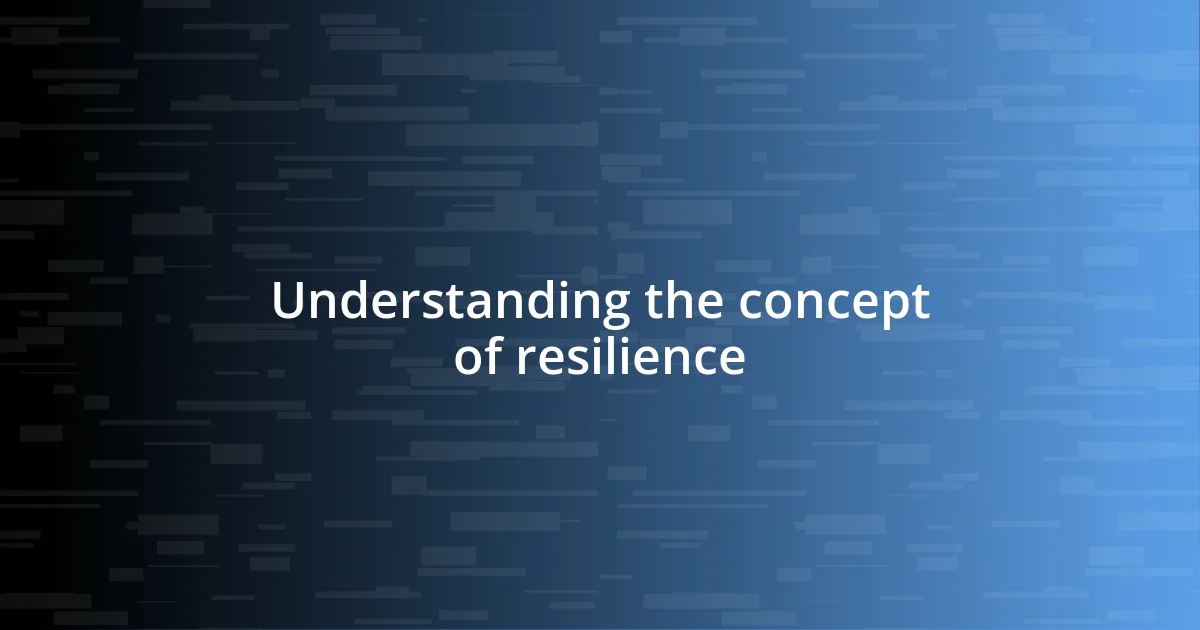
Understanding the concept of resilience
Resilience is often defined as the ability to bounce back from adversity. But to me, it’s deeper—it’s like a muscle that grows stronger with each challenge faced. I remember a particularly tough period when I lost a job I loved. It left me feeling numb and questioning my abilities. Yet, through that experience, I learned that resilience is about not just enduring hardship but also learning and evolving from it.
Consider this: when life throws obstacles your way, how do you respond? I realized that resilience involves a mindset shift; it’s about embracing change and uncertainty as part of life’s journey. During my toughest moments, I began to reframe setbacks as opportunities for growth. Instead of viewing challenges as insurmountable, I saw them as stepping stones toward something greater.
Moreover, resilience isn’t solely an individual trait; it’s often nurtured within supportive relationships. I fondly recall a friend who reminded me that it’s perfectly okay to lean on others during tough times. The emotional connection we share can act as a cushion that softens life’s blows. So, how do you cultivate resilience? Is it through self-reflection, support from others, or perhaps a combination of both?

Recognizing signs of struggle
Recognizing when you’re struggling can be a subtle yet powerful awakening. I’ve faced moments where I brushed off my feelings, thinking I just needed to push through. Yet, I learned to listen to those internal cues. When sleep evades you, or daily tasks feel overwhelming, those can be signs that something isn’t right. Ignoring those feelings can be tempting, but acknowledging them is the first step toward resilience.
Here are some common signs that indicate a struggle:
- Persistent feelings of sadness or anxiety
- Difficulty concentrating on tasks
- Increased irritability or mood swings
- Physical changes like headaches or fatigue
- Withdrawal from social interactions
- A sense of hopelessness or feeling trapped
Recognizing these signs empowers you to seek support and take proactive steps in your journey toward resilience. The key is being honest with yourself and honoring those feelings, as uncomfortable as they may be.
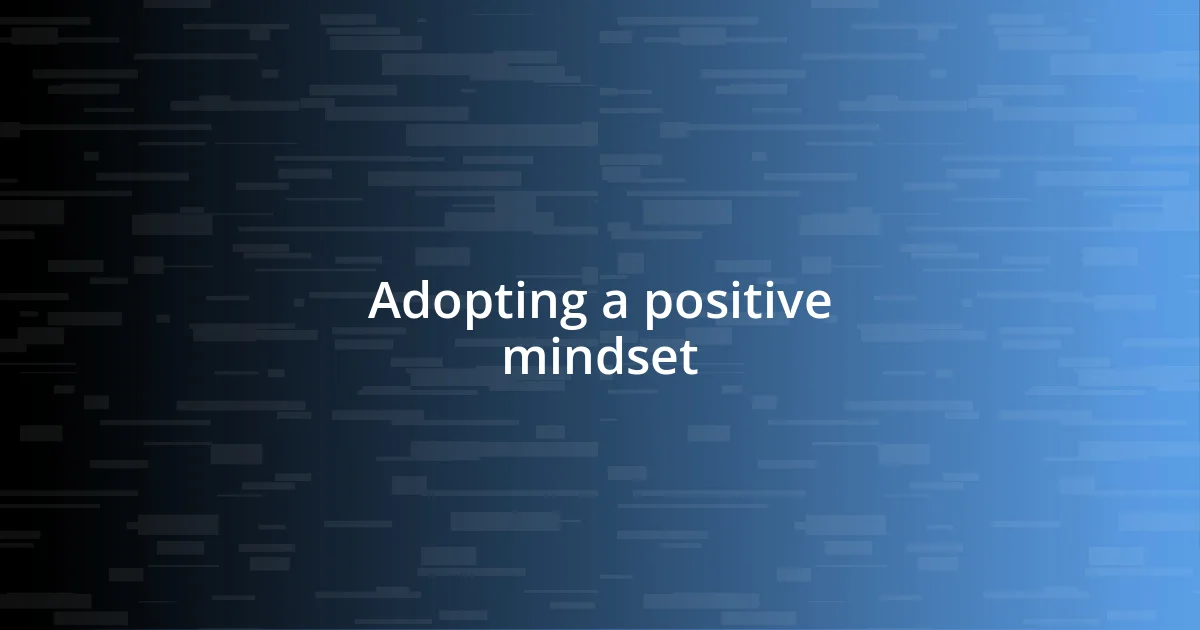
Adopting a positive mindset
When I think about adopting a positive mindset, I recall a specific moment in my life—a time when I felt everything was spiraling out of control. It was during the height of my stress, when daily worries piled up like a mountain. I decided to start each morning with gratitude, jotting down three things I was thankful for. This simple practice shifted my focus from what was wrong to what was right in my life. I noticed that even on tough days, finding small sparks of joy made a significant difference in my overall outlook.
Having a positive mindset doesn’t mean ignoring life’s difficulties; it’s about choosing to respond with hope and possibility. During a particularly challenging year, I often reminded myself of the power of perspective. I can vividly remember sitting on my porch one evening, soaking in a beautiful sunset while sipping tea. It hit me then—each day brings new opportunities. By embracing this mindset, I learned to actively seek silver linings, even amidst the storm. Isn’t it fascinating how a shift in thinking can transform your experience?
Practicing positivity also involves surrounding yourself with uplifting energy. I found that spending time with optimistic friends was infectious. Their enthusiasm often lifted my spirits and provided a reminder that we can navigate challenges together. Sharing encouraging words and laughter not only built my resilience but also forged stronger bonds. It’s incredible how our environment affects our mindset; can you recall a time when someone’s positivity inspired you to see things differently?
| Positive Mindset | Negative Mindset |
|---|---|
| Focus on solutions | Dwelling on problems |
| Embraces change and growth | Resists change and feels stuck |
| Encourages self-care and gratitude | Ignores personal needs and feelings |
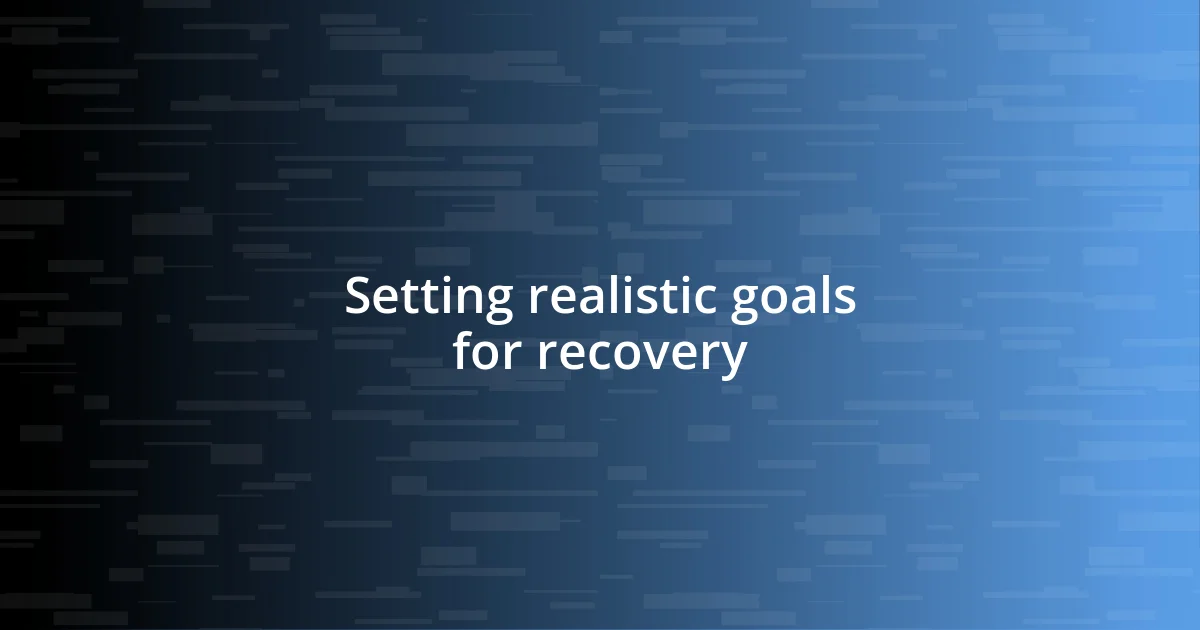
Setting realistic goals for recovery
Setting realistic goals is a crucial part of my recovery journey. I remember a time when I was overwhelmed by the enormity of my challenges, which made me want to set ambitious goals. Instead, I learned that breaking goals into smaller, manageable steps was the way forward. For instance, instead of aiming to get back to my normal routine instantly, I focused on achieving one small task a day, like taking a short walk or reading a few pages of a book. This not only reduced my anxiety but also provided a sense of accomplishment that fueled my motivation.
There’s something profound about celebrating those small wins. Each tiny step reminded me that progress doesn’t always mean a giant leap. Reflecting on those moments, I often asked myself, “What’s the next little victory I can achieve today?” This question kept me grounded and focused despite the chaos swirling around me. Setting goals in this way became a beacon of hope, showing me that even within tough times, I could still move forward, one step at a time.
I also discovered that adjusting my goals as I progressed was essential. At times, life threw unexpected challenges my way, and my original goals needed to shift. There were days when my energy levels plummeted, and I realized I couldn’t stick to my initial plans. Instead of feeling defeated, I learned to be flexible. I remember a day when I intended to finish a whole project but ended up needing to take a break. From that experience, I started to view setbacks not as failures, but as opportunities to recalibrate and reassess my goals—reminding myself of the importance of self-compassion in my recovery process. Isn’t it interesting how reevaluating our goals can lead us to deeper understanding and growth?

Building a support network
Building a support network is crucial when navigating tough times. I can recall a period when I felt utterly isolated, like I was carrying the weight of the world on my shoulders. During that time, I realized the importance of reaching out to friends and family, even when it felt challenging. I vividly remember a phone call with a close friend who listened without judgment. Just hearing someone acknowledge my struggles made me feel less alone, reinforcing the idea that vulnerability can be a strength.
I also learned that support extends beyond friends and family. Joining local community groups helped me connect with others facing similar challenges. I attended a workshop on resilience, where I met people who shared their stories of overcoming adversity. Their experiences inspired me, and I often found myself thinking, “If they can do it, so can I!” This camaraderie not only uplifted me but also served as a reminder that we’re often stronger together.
It’s fascinating how the act of supporting others can also reinforce my own resilience. I remember volunteering at an organization that helps those in need; sharing my time and energy lit a spark within me. Helping others reminded me that despite my own struggles, I had something valuable to offer. Have you ever noticed how acts of kindness can create a ripple effect of positivity? I found that building a support network isn’t just about seeking help; it’s about creating connections that uplift us all.
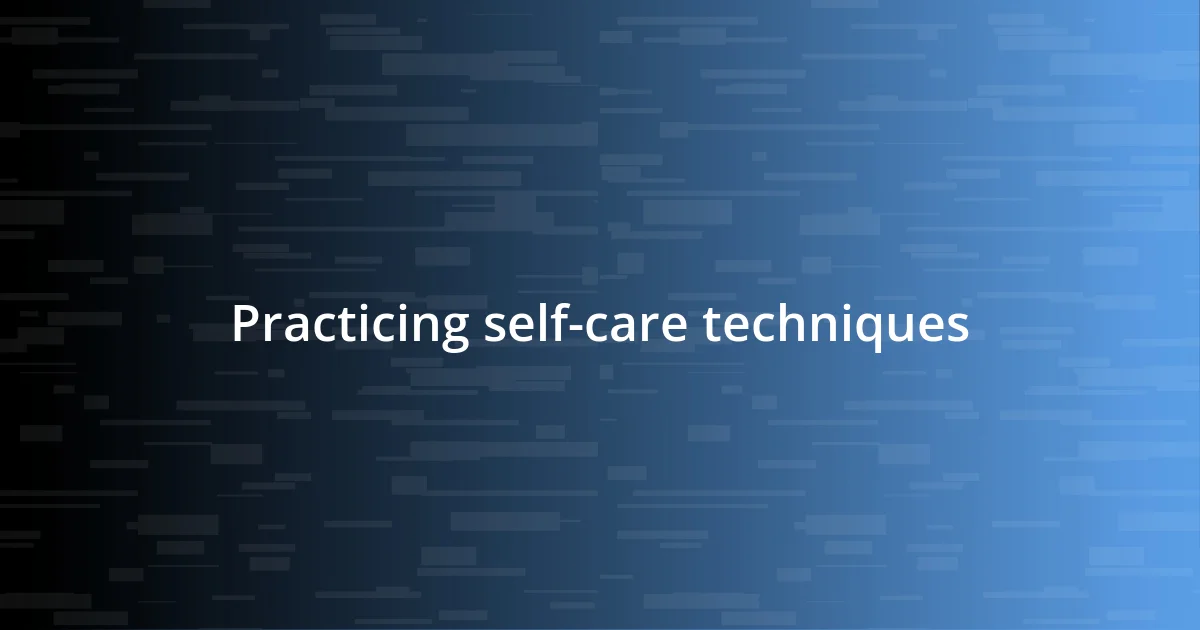
Practicing self-care techniques
Practicing self-care techniques became my lifeline during tough moments. There were days I felt completely drained, and that’s when I learned the power of simple things, like taking a warm bath or indulging in my favorite book. I remember one particularly difficult week; after I finally carved out time for a quiet evening with candles and soft music, I could feel my stress melting away. Isn’t it amazing how a little time devoted to oneself can change everything?
I also found mindfulness practices to be incredibly beneficial. During one stressful period, I started incorporating meditation into my daily routine, even if it was just for five minutes. I was skeptical at first—how could sitting quietly possibly help me? But as I began to embrace the stillness, I noticed my racing thoughts slow down. It taught me to be present, which was deeply grounding. Have you ever tried closing your eyes and simply breathing? The clarity it brought was refreshing and opened my eyes to how often I rush through my days without truly absorbing the moment.
Moreover, maintaining physical health is a crucial aspect of self-care that I couldn’t overlook. I remember trying to drag myself to exercise when I felt low energy, thinking it was pointless. But when I decided to turn on some music and dance around my living room, I laughed at how quickly my mood lifted. Movement became a celebration rather than a chore. Have you noticed how engaging in physical activity can transform your mindset? It’s an essential reminder that nurturing our bodies underpins our ability to withstand emotional challenges.












